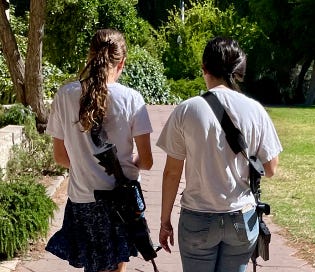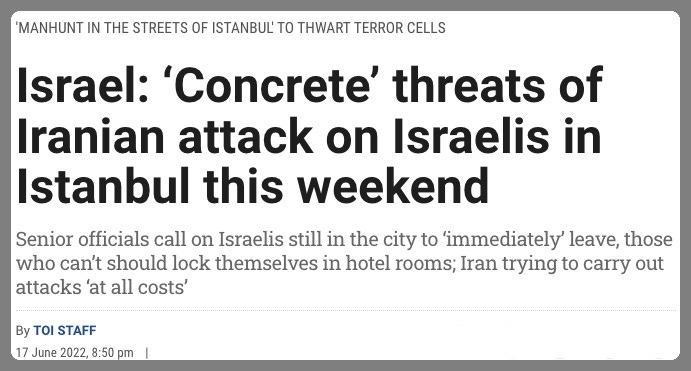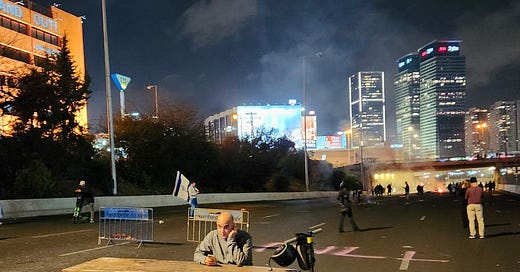

Discover more from Israel from the Inside with Daniel Gordis
Ten Spies, 60 Israeli Teenagers, Istanbul and Theodor Herzl
The "new Jew" Zionism so desperately sought to create, now everywhere one turns
I don’t typically mention the week’s Torah portion in these columns, but then again, it’s not often that while following the reading I’m reminded of a train ride, which in turn reminded me of Theodor Herzl. And throw in Istanbul for good measure.
But that’s the sort of place this is.
The day before yesterday, the weekly Torah portion in Israel was Shelakh Lekhah, which includes the story of the twelve spies whom Moses sent to scout out the land to which they were headed.
Two of them (Joshua and Calev) issue a glowing (and now famous) report:1
The land through which we passed to scout, the land is very, very good. If the LORD favors us, He will bring us to this land and give it to us, a land that is flowing with milk and honey.
Before them, though, the ten other spies had issued a dire warning about the land:2
The land through which we passed to scout is a land that consumes those who dwell in it, and all the people whom we saw in it are men of huge measure. And there did we see the Nephilim, sons of the giant from the Nephilim, and we were in our own eyes like grasshoppers, and so we were in their eyes.
It’s a much-discussed passage, not surprisingly, because it raises myriad questions. How could twelve people have seen the same land and returned with such different impressions? Given that these people had already escaped Pharaoh and his army, of what were they so afraid? Why did they feel as meek as grasshoppers? And since even the ten spies who gave the negative report agreed that it was “a land flowing with milk and honey,” what was so horrific about what they saw that led to the dire warnings?
Over the centuries, numerous explanations have been offered. For reasons that will become clear in a moment, I want to focus on that offered by the French Jewish philosopher Emmanuel Levinas (1906-1995), in his very popular book Nine Talmudic Readings.3 Basing himself on a Talmudic text which we won’t discuss here, Levinas suggests the following possibility:4
… the explorers, confronted by the inhabitants of Palestine, had misgivings [like that which] many others have said when they speak of Israeli children. Perhaps the explorers caught a glimpse of sabras. Fear seized them; they said to themselves: this is what awaits us there; these are the future children of Israel, those people who make holes wherever they set foot, who dig furrows, build cities, and wear the sun around their necks. But that is the end of the Jewish people!
“A different Jew, an unrecognizable Jew, is the end of the Jewish people,” they thought. A Jew who digs furrows and builds cities is too different to be an authentic continuation of the Jews they knew. Jews who “wear sun around their necks” are a different kind of Jew. Too different?
I’m not sure what Levinas meant by Jews who “wear sun around their necks,” but the phrase reminded me of a passage in Who By Fire: Leonard Cohen in the Sinai, Matti Friedman’s fabulous new book about Leonard Cohen’s visit to Israel during the Yom Kippur War. Friedman describes some of the soldiers lackadaisically resting at their base early on Yom Kippur, and remarks about one of them that he5
grew up poor in Haifa after his parents escaped the country called “the Holocaust.” (Where are your parents from? From the Holocaust.) These kids didn’t have much to do with that. They were the first generation of native “Israelis”—not tortured, not a minority, not religious, not exactly Jews, but creatures sprung from sunlight and salt water.
Not religious. Not exactly Jews. Akin, perhaps, to what Levinas imagines might have worried the ten spies.
But those young soldiers, some of whom would die in the very first minutes of the 1973 Yom Kippur War, were not exactly not-Jews, either. What were they? They were the products of the central project that is at the core of Israel’s very being: reimagining what it means to be a Jew – what one should do, what one should know, what one should be committed to, even what one should look like.
Reimagining and recreating the Jew is what this place is all about.
Levinas and Friedman are pointing to the same phenomenon – coming to this land would mean becoming like this land. Coming to a region soaked in sun would make us sun-creatures. Leaving Europe would mean leaving much of European Judaism behind. We would build, said the Zionist ideologues of old, not only a new Jewish state, but a new Jew, no less. One could love that Jew or not, perhaps even find her/him distasteful, but it was going to happen. No matter what people felt about it.
Yes, this would be a state, but the state would be a laboratory—a lab that imagined and created new Jews.
Which leads us to the train.
At least once a week, my wife and I spend the day in Tel Aviv / Givatayim, taking care of our grandson. Traffic in and out of both Jerusalem and Tel Aviv is often horrific, so some weeks we drive, but at other times, we take the train. The train’s especially great for the way home, when instead of battling the cars after a long and tiring day, we can doze or zone out until we get to Jerusalem.
The week before last, we took the train. It was surprisingly crowded for that time of the evening, but still, we found two seats.
There are a few stops in Tel Aviv, so the train crept for a couple of minutes until the stop just south of where we’d boarded. I was already AirPod’ed up and listening to music, hoping just to rest or even sleep until the train arrived in Jerusalem about 40 minutes later. But at that next stop, the train (or at least our portion of it) was suddenly overtaken by at least sixty exceedingly loud, hormonally overdosed Israeli teenagers, probably about 16 or 17 years old. Boys and girls, they were laughing, yelling to each other from opposite ends of the car. They were being … kids. It was impossible to hear anything other than them.
So much for the music. So much for the snooze.
I actually tried to summon up a modicum of righteous indignation, some reason to be justified in my being entirely annoyed. So I looked around, but tragically, they weren’t actually doing anything wrong. By the time they’d gotten on the train, there were hardly any seats left, so they were mostly standing in the aisle. But they were being pretty considerate of the people sitting near them, making sure that their backpacks didn’t swing into people, and they tried, as best they could, to give us all some space.
Still, it was annoying in the extreme, loud beyond description. But trying desperately to come up with a good reason to be legitimately appalled, I suddenly remembered meetings with the Foreign Ministry in my previous job, and found myself not annoyed, but moved by these kids.
In that job, almost twenty years ago, I used to go to Europe for work. Before our groups would depart, someone from the Foreign Ministry would invariably come to meet with us. The instructions were always the same: no Hebrew on your briefcase or backpack. No speaking Hebrew on the Tube or the Metro. Just stay quiet. Don’t call attention to yourself. If people on the train in France (particularly) or elsewhere find out that you are Jews, or Israelis, what then could happen may not be pretty.
Those kids on our train, had they been on a train in England or Germany, would have known very well that sixty ultra-rowdy Jewish teenagers on a train would have ended badly. They would have known that they had to be quiet. They would have known to stay under the radar. And that, of course, is the point of this place:
They get to be who they are without worrying that they have to make anyone else happy.
Zionist’s early ideologues knew that Europe would never become that. Nowhere, except for home, would ever become that. Remember what Herzl wrote in his 1896 pamphlet, The Jewish State, which set the Jewish world on fire and launched political Zionism.6
We have honestly endeavored everywhere to merge ourselves in the social life of surrounding communities and to preserve the faith of our fathers. We are not permitted to do so. In vain are we loyal patriots, our loyalty in some places running to extremes; in vain do we make the shame sacrifices of life and property as our fellow-citizens; in vain do we strive to increase the fame of our native land in science and art, or her wealth by trade and commerce. In countries where we have lived for centuries we are still cried down as strangers and often by those whose ancestors were not yet domiciled in the land where Jews had already had experience of suffering. The majority may decide which are the strangers; for this, as indeed every point which arises in the relations between nations, is a question of might. … In the world as it now is and for an indefinite period wilt probably remain, might precedes right. It is useless, therefore, for us to be loyal patriots, as were the Huguenots who were forced to emigrate. If we could only be left in peace. . . . But I think we shall not be left in peace.
Herzl was convinced that Jews having to hide, that Jews having to be on the defensive, was by no means solely a European phenomenon. He believed it was universal.7
Anyone who has, like myself, lived in this country [France] for a few years as a disinterested and detached observer can no longer have any doubts about this. In Russia there will simply be a confiscation from above. In Germany they will make emergency laws as soon as the Kaiser can no longer manage the Reichstag. In Austria people will let themselves be intimidated by the Viennese rabble and deliver up the Jews. …So they will chase us out of these countries, and in the countries where we take refuge they will kill us.
So they will chase us out of these countries, and in the countries where we take refuge they will kill us.
Herzl would not have been in the least bit surprised by the Boston Mapping Project and its not-so-subtle invitation to attack the Boston Jewish community (we’ll address that in a different column). What might have surprised him, though, and what might have given him pleasure, was Israelis’ reaction to being told by the Foreign Ministry that they should depart Istanbul at once, for Iranian agents are apparently searching Istanbul for Israelis to kidnap or murder this week.
Some Israelis, I assume, either cancelled their trips to Turkey or departed Istanbul early. What was more interesting, though, was that many did not. Speaking to the Israeli press, one Israeli tourist said that they were not worried. With Israeli and Turkish security forces in a desperate manhunt and a race against time to find the Iranian agents preying for Israeli victims, one could only hope that the confidence was not misplaced. “They’re always trying to frighten us,” they said of the Foreign Ministry.
You could read the paper and shake your head in dismay, asking yourself, “why are these people so stubborn, so nuts?” Alternatively, though, you could note that what Israel has done is to eradicate the fear, the nervousness, the tentativeness that Herzl believed would always characterize Diaspora life. Fear is no longer an instinct. For better and for worse, many Israelis have forgotten how to be afraid.
They’ve also forgotten how to be quiet on trains because they’ve forgotten how to be self-conscious.
If you’re a tired grandparent, it’s annoying in the extreme. But it’s also precisely what Herzl would have wanted.
Arriving to work last week, I happened upon these two students walking directly ahead of me, and couldn’t resist taking a quick photo. I don’t know if they were headed to reserve duty or were accompanying a group traveling somewhere, but I loved the nonchalance: both of them staring at their phones, chatting with each other, the flip-flops and M-16’s.
It’s not how Jews show up to class anywhere else, because Jews here are not like Jews anywhere else.
So once more, Levinas and his interpretation of what the spies were so afraid of:
Perhaps the explorers caught a glimpse of sabras. Fear seized them; they said to themselves: this is what awaits us there; these are the future children of Israel, those people who make holes wherever they set foot, who dig furrows, build cities, and wear the sun around their necks. But that is the end of the Jewish people!
Actually, not.
It’s not the end of the Jewish people, just the end of a certain kind of Jewish people.
On campus pathways, on intercity trains and even in Turkish hotels — one can’t help but notice that these young Israelis might not wear the sun around their necks, but, as Matti Friedman put it so adroitly, they are “Israelis—not tortured, not a minority, not religious, not exactly Jews, but creatures sprung from sunlight and salt water.”
Not everyone loves these new creatures, unafraid, unabashed, in-your-face and brimming with confidence. But, they would say to the world, if they were asked —
“You can love us or you might not. The whole point of this place is that we no longer care.”
With the Bennett government teetering (and possibly falling in the coming days), we reached out to the first MK who challenged the legitimacy of the coalition from the very beginning. MK Amichai Chikli, a member of Bennett’s Yamina party, refused to vote with the coalition from the very beginning, and has now been ousted from the party.
Chikli did speak about that, explaining why he thinks Bennett never should have been Prime Minister in the first place, but with his characteristic “take no prisoners” style, he also spoke about progressivism in the United States and its danger to Israeli youth, why he is worried about Israel’s next generation of adults, the anti-Semitism of BLM and the Palestinian movement, why he refused to sit in a coalition with Mansour Abbas’ party, and much more.
You will likely not agree with everything that Chikli says, and if you’re more comfortable with the (usually) genteel style of American political interviews (apropos the “in your face” style in the column above, you’ll have to hold on to your seat for this one.
But I suspect that, agree or not, you will find yourself moved by the passionate devotion to Zionism, the clear-eyed take on what is happening in many parts of Israel, and the confidence of a still-young politician who has many years of productivity ahead of him.
On Wednesday, we will post a brief excerpt of our conversation accessible to all, and the full podcast as always, for paid subscribers to Israel from the Inside.
Our twitter feed is here; feel free to join there, too
Numbers 14:6-8. Robert Alter’s translation.
Numbers 13:32-33. Robert Alter’s translation.
My thanks to Mor Henik, a graduate of Shalem College who knows infinitely more about Levinas than I ever will, for first pointing this source out to me.
Emmanuel Levinas. Nine Talmudic Readings (p. 86). Indiana University Press. Kindle Edition.
Matti Friedman, Who by Fire: Leonard Cohen in the Sinai (New York: Spiegel & Grau, 2022), page 13.
Herzl, Theodor. Theodor Herzl Collection: Jewish State and Altneuland (p. 15). Kindle Edition.
Theodor Herzl, The Complete Diaries of Theodor Herzl (New York: The Herzl Press, 1956), 131-132, cited in Jehuda Reinharz and Yaacov Shavit, Glorious, Accursed Europe (The Tauber Institute Series for the Study of European Jewry); Waltham: Brandeis University Press, 2010), page 91.
Subscribe to Israel from the Inside with Daniel Gordis
Israel from the Inside is for people who want to understand Israel with nuance, who believe that Israel is neither hopelessly flawed and illegitimate, nor beyond critique. If thoughtful analysis of Israel and its people interests you, welcome!





















Thank you for this excellent article. This may be a little early, since you're planning to write about the "Mapping Project" in Boston, but I think this column touches on an aspect of Diaspora life that is very frustrating. Here in Boston, after the Mapping Project become public, our Jewish leaders sounded depressingly eager to placate our enemies and even to distance themselves from Israel. One wrote: "You can protest Jewish organizational policies/positions vis-a-vis Israel all you want (or even boycott Israel), but once you call for dismantling the basic Jewish communal infrastructure, you’ve crossed the line to antisemitism." Another complained that the Project was "blaming our community for the existence of Israel" and "they didn’t just name 'pro-Israel' advocacy groups like AIPAC or criticize ADL and JCRC." Both of these statements felt like efforts to distance the bulk of the American Jewish community from the right wing (who presumably are okay to boycott and target), and even from Israel in general. I hate to criticize our leadership, who devote their careers to serving our community, but this pleading attitude feels like exactly what you're describing above in Parshat Korach, and also what the Israeli teens on the train were happily rejecting. I wish that for once, our Boston leadership would just say to the haters: "We like Israel! Go *#*# yourselves!" It might not ever happen, but it would be refreshing if it did.
how ironic that this piece by Eli Spitzer was published on the same day as DG's post:
https://mosaicmagazine.com/observation/israel-zionism/2022/06/the-end-of-the-new-jew-and-the-rebirth-of-the-old/?utm_source=Klaviyo&utm_medium=campaign&utm_campaign=2022-06-20&_kx=YXBUzCi-l8pZp7QkasOT7rOYWYWHf8A-R2KXMbMPAl4%3D.L87CGh